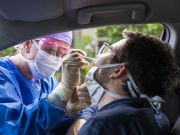- Could Your Grocery Store Meat Be Causing Recurring UTIs?
- Are You Making This Expensive Thermostat Error This Winter?
- Recognizing the Signs of Hypothyroidism
- 10 Strategies to Overcome Insomnia
- Could Artificial Sweeteners Be Aging the Brain Faster?
- Techniques for Soothing Your Nervous System
- Does the Water in Your House Smell Funny? Here’s Why
- Can a Daily Dose of Apple Cider Vinegar Actually Aid Weight Loss?
- 6 Health Beverages That Can Actually Spike Your Blood Sugar
- Treatment Options for Social Anxiety Disorder
Contact Tracing Useless Unless It’s Speedy: Study

It’s the Holy Grail for containing the spread of coronavirus, but contact tracing only works if it is done quickly, researchers report.
The modeling study showed that even if all contacts are successfully traced, a delay of three days or more between the start of symptoms and testing will not reduce transmission of the virus sufficiently to control further spread.
The news couldn’t come at a worse time, as surging coronavirus cases are swamping labs across the country and triggering delays in test results.
To be successful, contact tracing must keep the rate of transmission of the virus below 1, which means the average number of people who will be infected by a single infected person must be less than 1.
The researchers compared the effectiveness of conventional and app-based contact tracing strategies.
The best case scenario — no delays and at least 80% of contacts traced — would reduce the rate of transmission from 1.2 to around 0.8, and 80% of onward transmission by a diagnosed person could be prevented.
But for conventional contact tracing to be effective, test results need to be delivered within a day of a person developing symptoms, according to the new study, published July 16 in The Lancet Public Health journal.
In the United States, a 24-hour turnaround has become nearly impossible. As cases soar, labs across the nation are falling behind in processing and delivering test results, two of the country’s biggest lab companies told CNBC. Even though more testing is available now, it is not enough.
“Despite that dramatic increase [in testing capacity], demand for testing is increasing even faster,” Quest Diagnostics told CNBC. “As a result, our average turnaround time for reporting test results is slightly more than one day for our priority 1 patients [hospital patients and health care workers fall in this group]. However, our average turnaround time for all other populations is seven or more days.”
LabCorp, another coronavirus test manufacturer, expressed the same concerns, saying that demand for testing is outpacing capacity. The company said it is processing more than 130,000 tests per day and plans to increase that to 150,000 per day by the end of the month, CNBC reported.
“Until recently, we have been able to deliver test results back to patients on average between one to two days from the date of specimen pickup,” a LabCorp spokeswoman said in a statement. “But with significant increases in testing demand and constraints in the availability of supplies and equipment, the average time to deliver results may now be four to six days from specimen pickup.”
One emergency room doctor noted that if test results continue to be delayed, things look bleak.
“This article points out that while social distancing and mask wearing are effective at decreasing the spread of this novel virus, contact tracing will be necessary to decrease it further,” said Dr. Teresa Murray Amato, chair of emergency medicine at Long Island Jewish Forest Hills, in Queens, N.Y. “However, unless the time from testing until results are complete in under 24 hours, contact tracing may be futile.”
One thing that might help speed things up is mobile apps: They can accelerate contact tracing and keep the rate of transmission below 1, even if only 20% of the population uses them, according to the new study.
Improved access to testing, combined with apps that minimize tracing delays, will be crucial to the success of contact tracing, the researchers concluded.
“This study reinforces findings from other modeling studies, showing that contact tracing can be an effective intervention to prevent spread of the SARS-CoV-2 virus, but only if the proportion of contacts traced is high and the process is fast,” said study co-author Mirjam Kretzschmar, from University of Utrecht in the Netherlands.
“Our study builds on this to show, in detail, what role each step in the process plays in making this approach successful,” she said in a journal news release. “This will help policymakers understand where best to prioritize resources to maximize the chances of success.
“For example, we found that mobile apps can speed up the process of tracking down people who are potentially infected, but if testing is delayed by three days or more even these technologies can’t stop transmission of the virus,” Kretzschmar noted.
Further research is needed to assess how effective apps are and how best to incorporate them into contact tracing, an accompanying editorial said.
“As contact tracing remains a crucial component of the COVID-19 response, mobile apps offer promise, especially when considering the speed and scale required for tracing to be effective,” wrote Dr. Louise Ivers, from Harvard Medical School, and Daniel Weitzner, from the Massachusetts Institute of Technology.
“However, understanding the potential impact of apps as part of a comprehensive integrated approach requires more evaluation of their use in real life and multidisciplinary engagement of technologists, epidemiologists, public health experts and the public,” they added.
More information
The U.S. Centers for Disease Control and Prevention has more on COVID-19.
Source: HealthDay
Copyright © 2026 HealthDay. All rights reserved.










